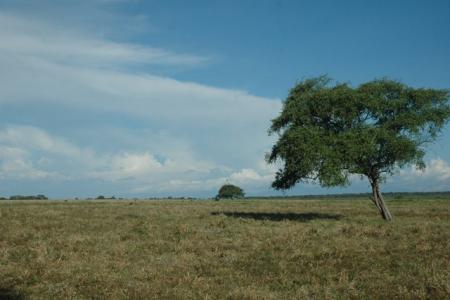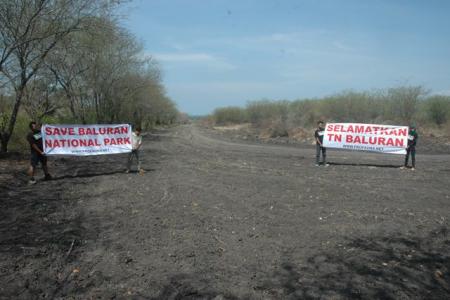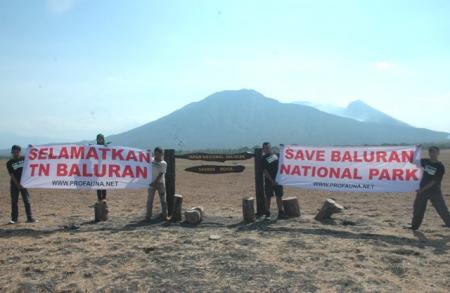Save Baluran National Park!
The ecosystem of Baluran National Park in Situbondo regency, East Java, Indonesia is facing a great threat from a nickel smelter which is going to be erected right outside the national park border. Activists are concerned that the smelter is going to bring negative impacts for the natural environment around the national park, either directly or not, and harm the lives of wildlife such as the Banteng, Water buffalo, deer, and Dhole (Asiatic wild dog).
Observation conducted by Protection of Forest & Fauna (PROFAUNA) Indonesia in the end of August 2014, the smelting company has opened the land to build the facilities, in an area adjacent to the national park's territory. The land clearing is only 500 meters away from the park's entrance. "Such land clearing activity could put the wildlife in danger, because it is very likely for the animals to cross the border of the national park and into the smelter's land," said PROFAUNA's campaign officer, Swasti Prawidya Mukti.
"PROFAUNA deplores the establishment of nickel smelter next to the Baluran National park, because it will surely imperil the ecosystem. The company must be able to show their environmental impact assessment documents to the public," added Swasti.
 The head of Baluran National Park, Emi Endah Suarni, in an interview with PROFAUNA confirmed the nickel smelter establishment plan. However, the national park administrators have never been shown the environmental impact assessment by the company. They hope that the company would soon provide fencing along the territory border, to prevent the wild animals from trespassing into the land clearing area.
The head of Baluran National Park, Emi Endah Suarni, in an interview with PROFAUNA confirmed the nickel smelter establishment plan. However, the national park administrators have never been shown the environmental impact assessment by the company. They hope that the company would soon provide fencing along the territory border, to prevent the wild animals from trespassing into the land clearing area.
Baluran National Park's area encompasses a land as large as 25.000 hectares. Wildlife surveys recorded that the national park is inhabited by 217 bird species and 26 mammals including the banteng or tembadau (Bos javanicus javanicus), watel buffalo (Bubalus bubalis), dhole or asiatic wild dog (Cuon alpinus javanicus), muntjac or barking deer (Muntiacus muntjak muntjak), rusa deer (Cervus timorensis russa), leopard cat (Panthera pardus melas), java mouse-deer (Tragulus javanicus pelandoc), and fishing cat (Prionailurus viverrinus).
Health and Ecological Hazard
On 12 January 2014, Indonesia's President Mr. Susilo Bambang Yudhoyono announced the Regulation no. 1 of 2014, which bans the export of raw minerals extracted from Indonesian mines, as a manifestation of the Law no. 4 of 2009 on Mineral and Coal Mining.
The regulation also requires mining companies to biuld smelters in the country, to process raw minerals and refine raw metal minerals to a certain minimum standards before these minerals (tin, nickel, copper, gold, silver, etc.) can be exported, also in hope that such policy could boost the investment value in Indonesia's mining industry.
 From the environmental point of view, there are several negative impacts coming with the nickel smelting industry. Firstly, smelter takes huge amount of electricity and coal as the fuel during the smelting process. In the end of the process, the system will produce solid waste and SO2 (Sulfur Dioxide) gas which could induce acid rain. This acid rain, when it goes down into the soil, will increase the acidity of the soil and ground water.
From the environmental point of view, there are several negative impacts coming with the nickel smelting industry. Firstly, smelter takes huge amount of electricity and coal as the fuel during the smelting process. In the end of the process, the system will produce solid waste and SO2 (Sulfur Dioxide) gas which could induce acid rain. This acid rain, when it goes down into the soil, will increase the acidity of the soil and ground water.
One real example of a destruction caused by nickel smelting is the town of Norilsk, Russia, which used to the the world's largest heavy metals smelting complex. more than 4 million tons of cadmium, copper, lead, nickel, arsenic, selenium and zinc are released into the air every year. Air samples exceed the maximum allowance for both copper and nickel. As a result, within 48 km of the nickel smelter there is not a single living tree.
In human and animals, all nickel compounds may cause respiratory irritation, pneumonia, emphysema, hyperphlasia, and fibrosis. Experiments proved that nickel compounds could also cross placental barrier in mammals, lead to fatal embryonic development or malformation. other laboratory experiment result shows that injections of nickel compounds to particular organs in animals provoke development cancer due to cell mutations.
For further information, please contact:
Swasti Prawidya Mukti,
Campaign Officer, PROFAUNA Indonesia
Email: asti@profauna.net

